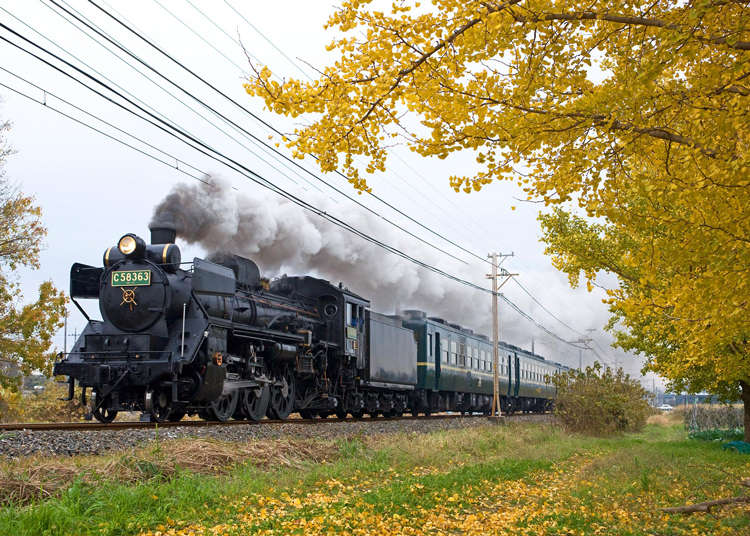
The SL Paleo Express is the closest steam locomotive from the center of Tokyo City. A round trip from Kumagaya Station to Mitsumineguchi on the Chichibu Railway takes a total of approximately 2 hours 40 minutes each way.
As we get deeper and deeper into the autumn season, the area begins to attract visitors from all over the country to catch the spectacular autumn view of the colorful foliage decorating the Chichibu Mountains right from their seats on the train.
Passengers can ride from any available seat of the four cars, as designated seats are not necessary. Today, we will report directly from the SL Paleo Express with all the information you need to know, from the moment you purchase your ticket!
What Exactly Is "Paleo?"
The name "SL Paleo Express" comes from the Paleoparadoxia, a large, ancient sea mammal that inhabited the Chichibu area over 20 million years ago. There are even original characters based on this creature called "Paleo-kun" and "Palena-chan" who sometimes make an appearance at events and at the stations. Be sure to keep a lookout for them when you ride the Chichibu Railway!
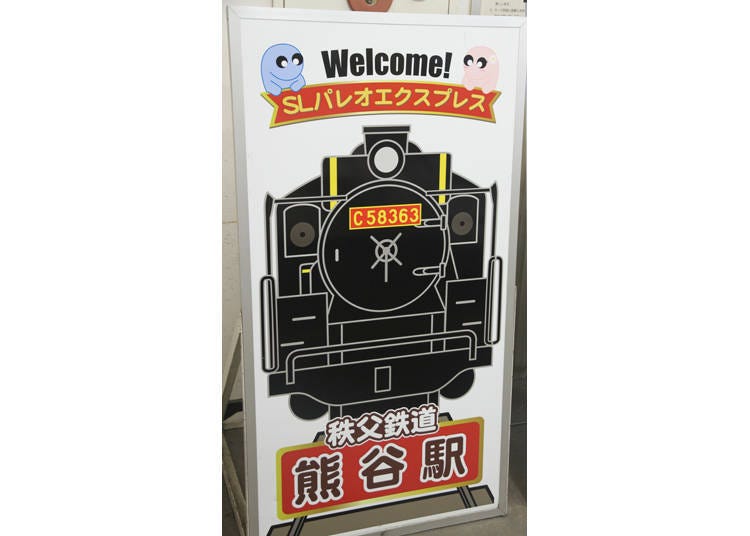
Buying Tickets for the SL Paleo Express
First of all, be sure to check the dates of operation on their official website before going to buy your tickets to the SL Paleo Express. It is generally open on weekends and holidays, however on days other than these, only limited dates are available.
To secure your ride, make a reservation in advance for your SL Ticket (520 yen) before you board. Book your tickets at the designated purchase windows, by telephone, or from their official website up to one month in advance. When booking from the website, make sure to keep your "reception number" which you will receive after selecting your desired date and boarding area on the reservation form. Bring that number to the corresponding window with that number in order to purchase your ticket.
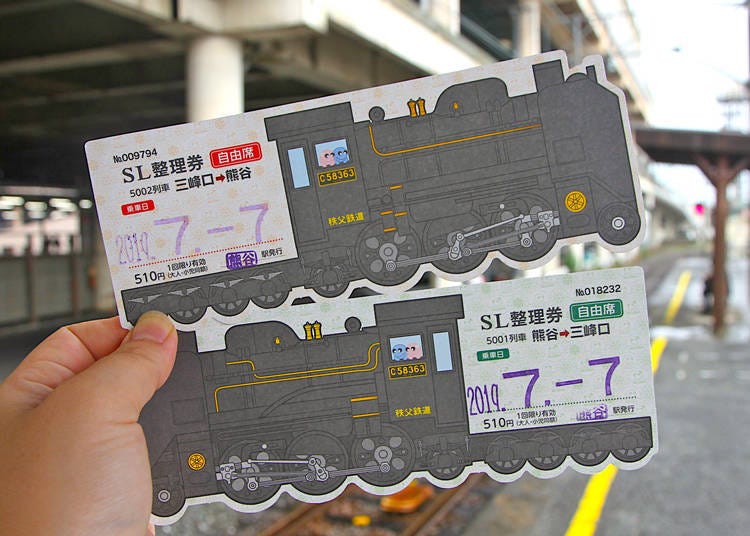
In order to ride the SL Paleo Express, you will need not only your numbered ticket but a regular boarding pass as well. If your round-trip travel will amount to more than 740 yen, then we recommend purchasing a 1-day unlimited pass, which allows you to ride the Chichibu Railway as many times as you want for the entire day (1470 yen for adults, 740 yen for kids).
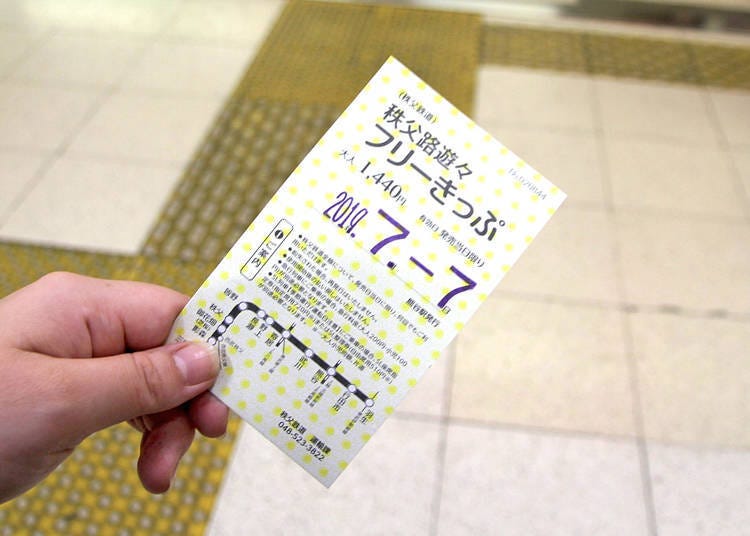
At the time, I wasn't sure which ticket I should buy, but thankfully the ticket office staff were very kind and helpful.
Now Departing Kumagaya Station!
Deciding to make a round trip and see every area we can, we depart from Kumagaya Station, a big city also said to be the center of northern Saitama Prefecture. The ticket gate to the Chichibu Railway is right next to the JR ticket gate and has a really nice atmosphere.
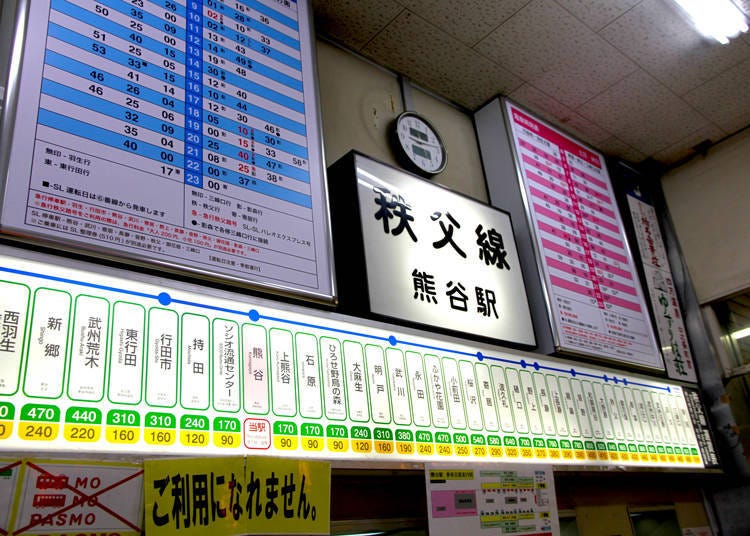
You can buy snacks and memorabilia by collecting SL Paleo Express memorabilia stamps at the stations.

After a short wait on the platform, the SL Paleo Express pulls into the station via electric locomotive and is soon ready to board.

We also got to watch an electric locomotive being separated and making its return for the day.

At last, we board the SL Paleo Express and are off on our way!
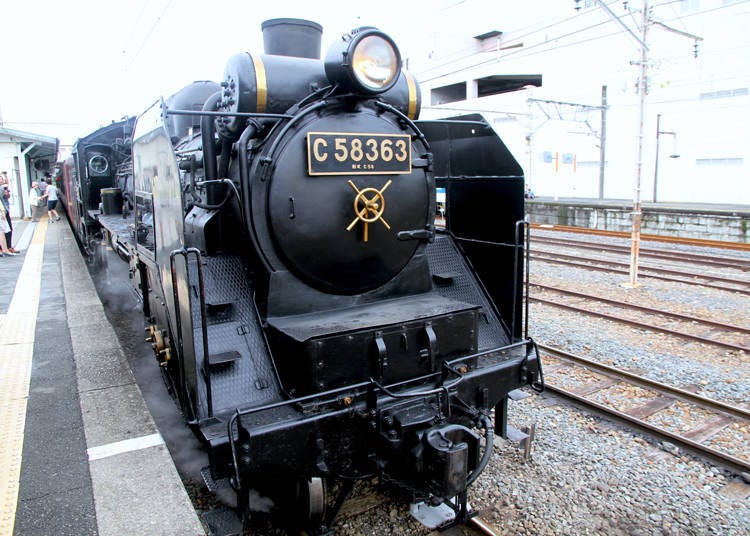
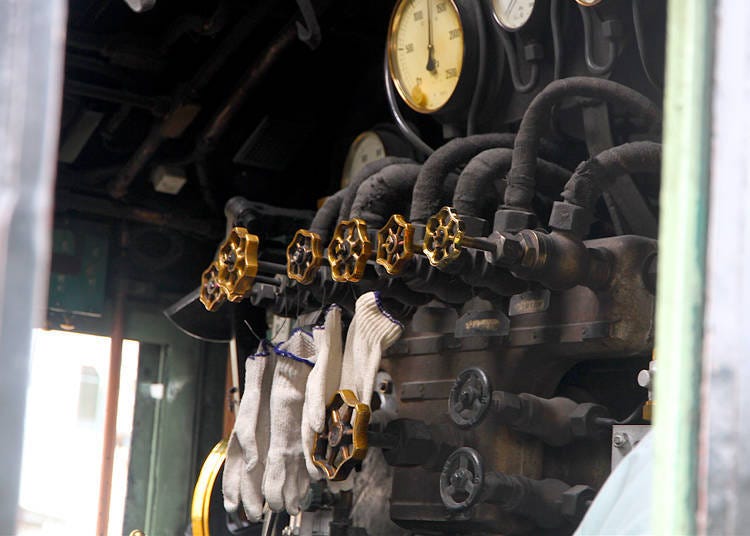
The day of our trip was not during peak season, and fell on a rainy weekday, so it was fortunate that we didn't have to wait too long on line. It tends to become very crowded during the fall season with people coming to see the autumn leaves, so it is best to get to the platform early if you want to guarantee a good seat.
I personally recommend staying around Kumagaya Station the night before your trip. Kumagaya has flourished as a city since the Edo Period long ago, being a hub for the Nakasendo route back then, so even to this day there are plenty of delicious eateries and many shops to enjoy during a the night around town. Being so close to the station for your ride the following morning, staying here will kill two birds with one stone!
What Seats Do You Recommend?
The most popular seats of the SL Paleo Express are the window seats at the rearmost area of the vehicle. From here, you can see the locomotive up ahead as it turns along the tracks.
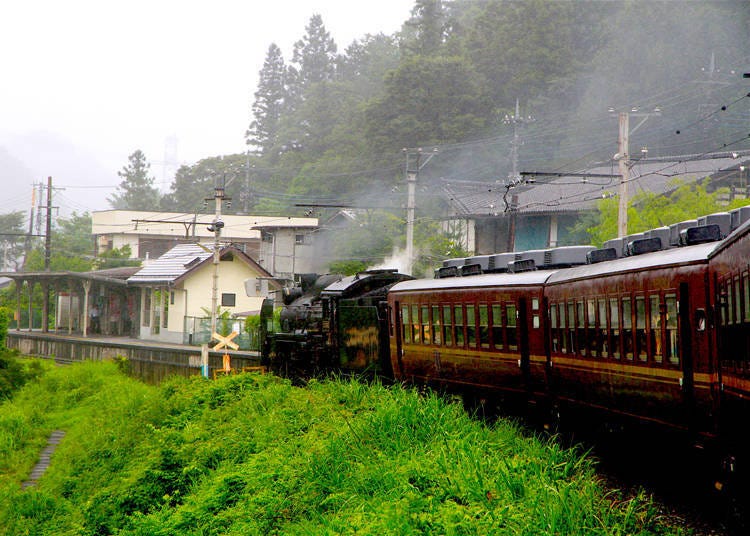
Watch the smoke spout from the locomotive as you enjoy the sights, sounds, and feelings unique to a ride on such a vehicle!

Unfortunately, you can't see the body of the train running before you from the front car the way you can in the back, however the force of the steam engine can still be felt rather powerfully.
Kumagaya~Takekawa: Enjoyment from the Comfort of your Seat
After successfully securing a seat in the last car, the SL journey begins.

The Paleo Express passenger car is a retro Showa-style refurbishment of the JNR (Japan National Railways) Series 12 passenger car that was manufactured from 1957 to 1969. Surrounded by the glossy red box seats and wood grain furnishings, you will feel as if you are riding right in an old movie.

What makes this trip even more exciting is the in-car broadcast performed by Chichibu City rakugo performer, Hayashiya Taihei. He provides guidance and information about each station with fun and friendly narrative.
One point of focus you will want to pay attention to between Kumagaya and Takekawa is the Hirosegawara Depot, a must-see for all fans of trains and railways.

This is the base where vehicle maintenance, cleaning, and inspection is performed.
Takekawa~Yorii: Exploring the Train!
After Takekawa Station, the SL runs through the relaxing countryside and residential areas for a while.

It was surprising to see so many people waving at the train from the outside while watching the cityscape pass by through the window. We waved back at many people, including kids watching the train from near the tracks, and dads walking their dogs around the town.
While we're at it, let's explore the other cars!

You can see the coal-car from the small window in the front of the first car.

The train also has restrooms on board, so you don't have to worry when taking long trips!
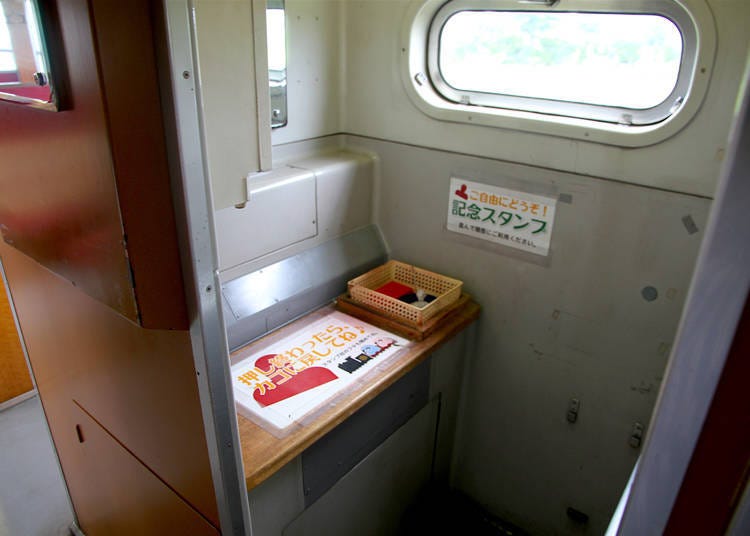
This small, retro room houses a little booth where you can find one of the ride stamps.
SL Paleo Lunch: The Best Bento Lunch Box
You can't just take a long train ride and not enjoy a boxed lunch! There is a special in-car menu with limited-edition lunch options.
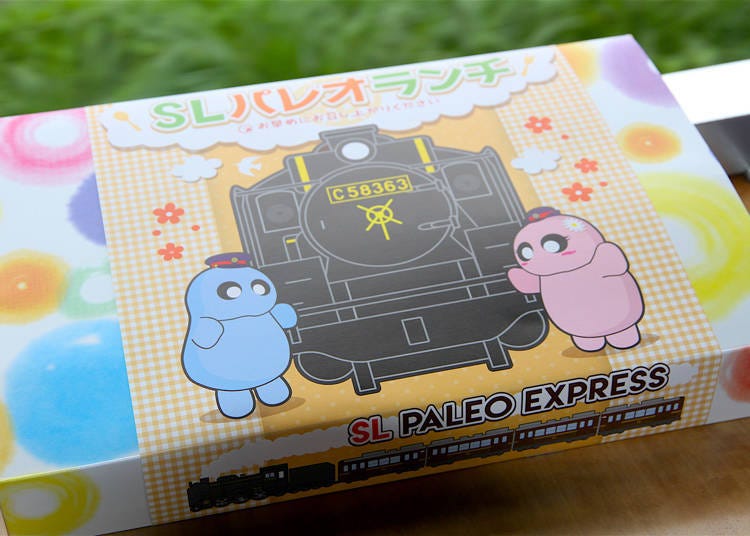
The lunch packaging features a cute design with characters Paleo-kun and Palena-chan. When you open the box, there is a sheet of seaweed cut into the shape of the train topping the rice.
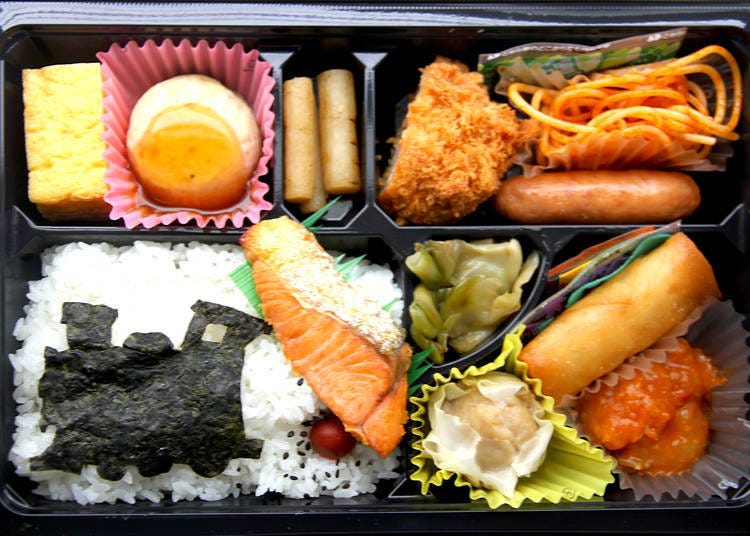
But the real excitement of this lunch lies not just in the appearance, but in the delicious taste! It is a great combination of both Japanese and Western foods. The Japanese foods include traditional kaiseki sides, such as fish, boiled vegetables, and egg. There are also Chinese spring rolls and chili shrimp, with fried and pickled vegetables. Finally, the Western menu offers a thick cutlet, sausage, and spaghetti. It's a truly high-quality meal!

The best part was that each piece tasted as authentically delicious as it should!

Even the plastic baran garnishing sheet is in the shape of the SL! This is a super popular lunch box, though, so be sure to grab one the moment you can!

Yorii~Nagatoro: A View of Lake Tamayodo!
Once you pass Yorii Station, the Chichibu Mountains come into view. After passing Hagure Station, you will see Lake Tamayodo, created from the waters of the Arakawa River.
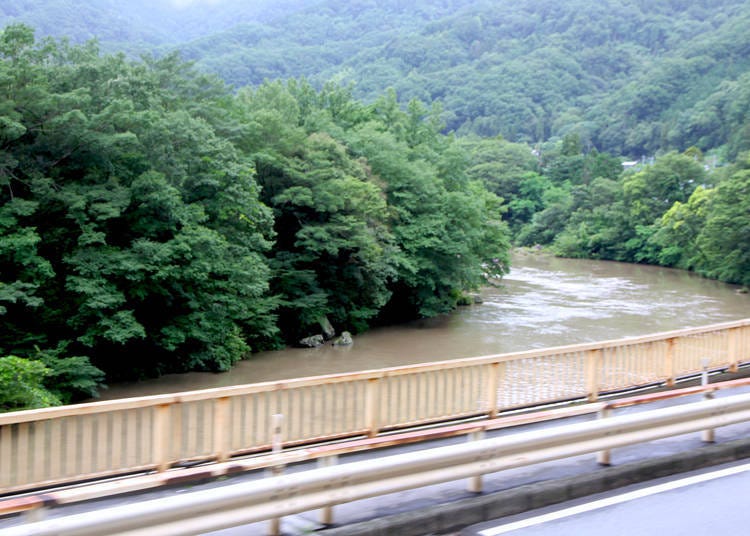
Unfortunately, it was a bit cloudy when this photo was taken, however on a clear day you can see the beautiful green of the water's surface.

A nice scene of where the SL and the cars on the road run side-by-side.
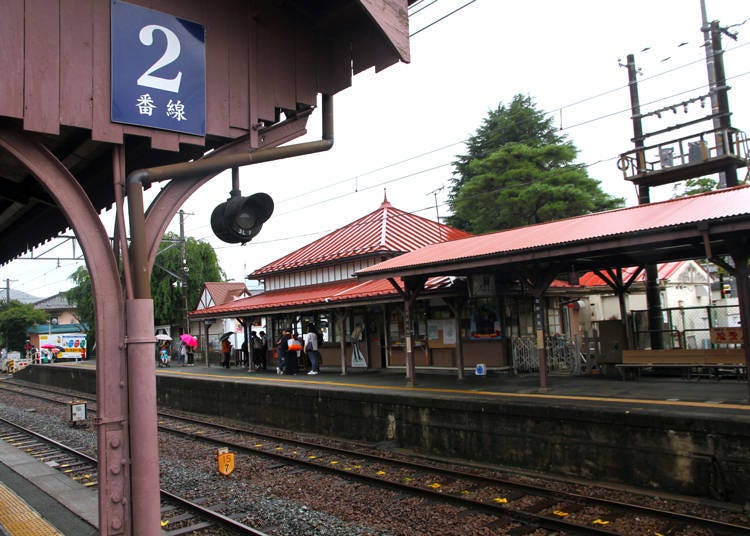
The style and atmosphere of Nagatoro Station matches the mountain scenery.
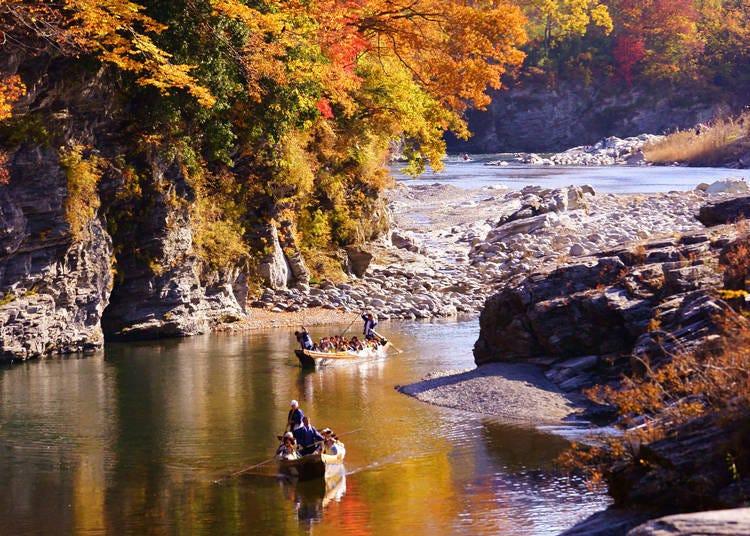
The Nagatoro Area is a popular tourist destination for its amazing views of the rock formations and Line Kudari downstream river boating. It also boasts a gorgeous autumn foliage landscape. Many people get on and off here, and it is another spot you may want to check out in the coming season.
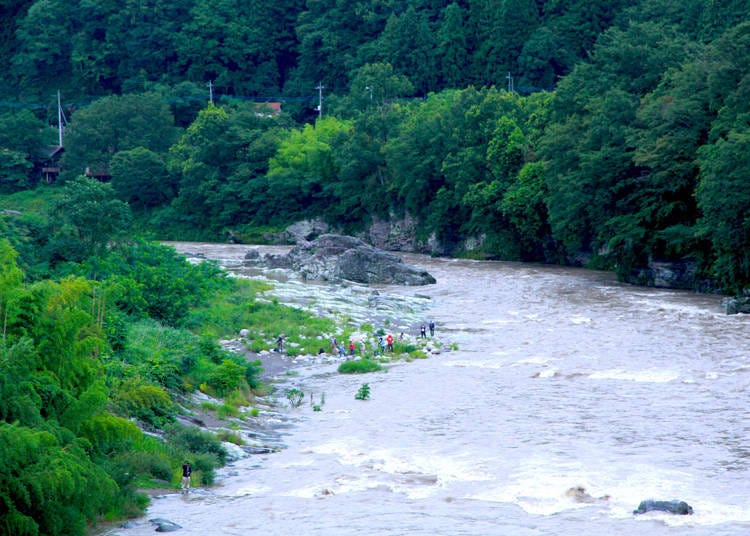
Nagatoro~Minano: A View of the Mountains and Clear Stream
Between Nagatoro and Minano we ride over the Arakawa Bridge, the longest bridge of the Chichibu Railway. With a length of 167 meters and a height of 20 meters above the water surface, you can enjoy the scenery of the Arakawa River flowing underneath from the window.
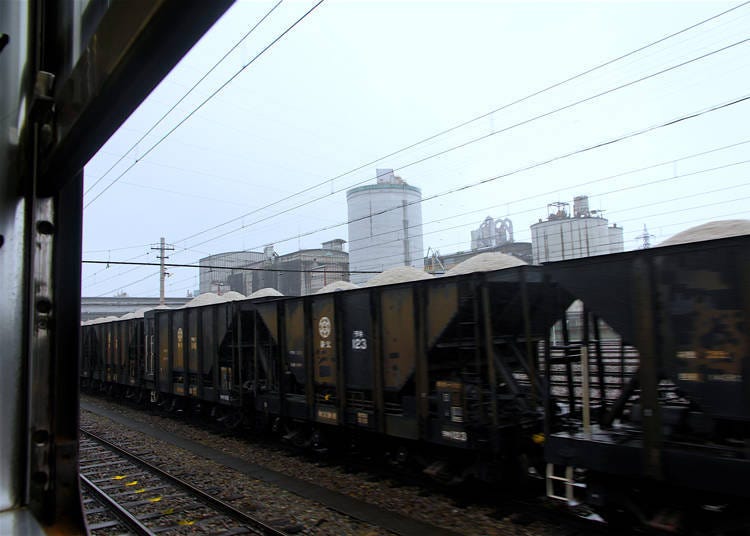
Minano~Chichibu: Cool Cargo Station and Hopper Car
On the way from Minano to Chichibu Station you will see the Bushu-Haraya Cargo Station. It is a unique spot with a cement factory located right next door.

The Chichibu Railway carries limestone that is gathered from Mount Buko in Chichibu City. There's also a good chance you will encounter the ore transportation hopper freight train!
Chichibu~Ohanabatake: The Center of Chichibu Railway
From this section we pass through the central area of the Chichibu Region. If you have the chance, you may want to get off at Chichibu or Ohanabatake Station. There is much to do, including visit the Chichibu Shrine, which is famous for the Chichibu Night Festival held there, walk through the nostalgic streets, and enjoy their famous soba noodles and Waraji Katsudon.

Around here is also where you can see the magnificent view of Mount Buko from the train window. (Unfortunately, I couldn't see it due to the rain and fog). During the spring time you can also see the cherry blossom trees in full bloom right in front of Ohanabatake Station, which attracts many visitors each spring.
Ohanabatake~Mitsumineguchi: Crossing a Historic Bridge
In this last stretch of the way, right before the ending point of our trip, we see the impressive natural beauty of the mountains.
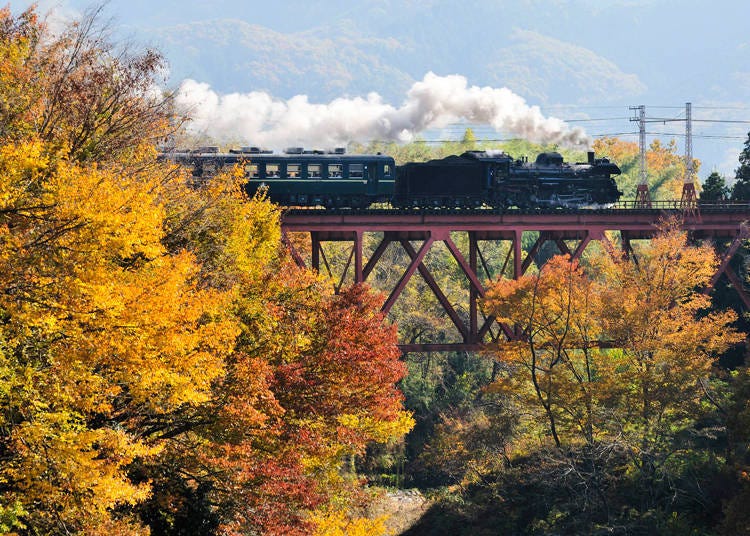
The Anyagawa Bridge is the tallest railway bridge along the Chichibu Railway. Crossing this iron bridge over the deep valley is a thrilling moment of excitement. (Once again, though the image in the photo is cloudy, you can see the beautiful, clear stream on a sunny day).
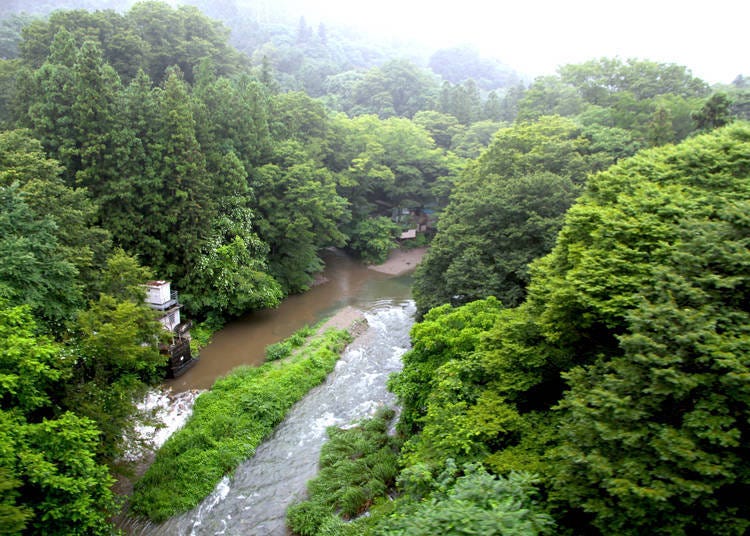
The Anyagawa Bridge is a truss bridge built with a structure called the Baltimore Truss, which was used quite frequently during the Meiji and Taisho Periods. With a long history and a beautiful image, it is nice to be able to see it from outside the train, as well. The Anya-hashi Bridge is only a 5 minute walk from the Chichibu Railway Bushu-Hino Station, and is a very popular observation spot. (Because Bushu-Hino station is a local station, the SL Paleo does not stop here).
Last Stop: So Much to do at Mitsumineguchi Station!
At last we arrive at the end of the line, Mitsumineguchi Station!

From this station, colored in a refreshing mint-green, you can access popular spots such as Lake Chichibu and Mitsumine Shrine. Many people also enjoy hiking around here.
Something you will definitely see when riding the SL Express to Mitsumineguchi is "Maintenance Work" and "Railroad Turntables." The SL runs with coal and water in the coal-car (tender), however it takes about one ton of coal and nine tons of water for one round trip between Kumagaya and Mitsumineguchi!
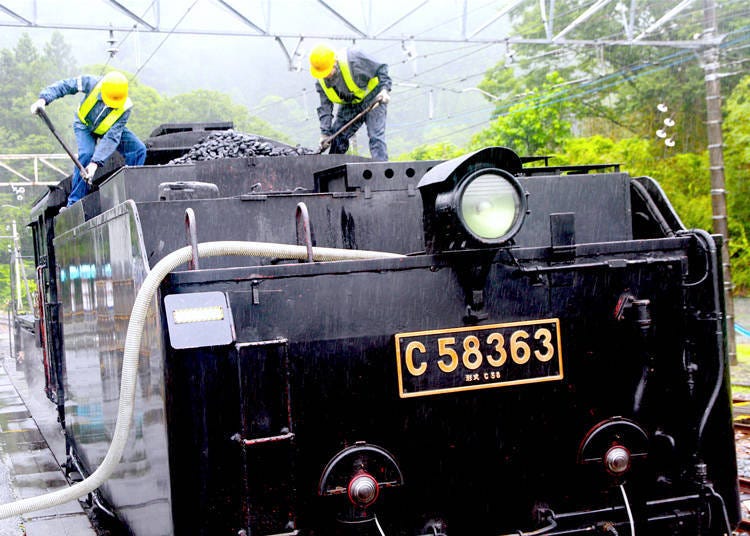
Because of this, the engineers are consistently working to maintain water supply, coal discharge, oil, and coal levels. After maintenance and replenishing, the SL heads to the turntable.
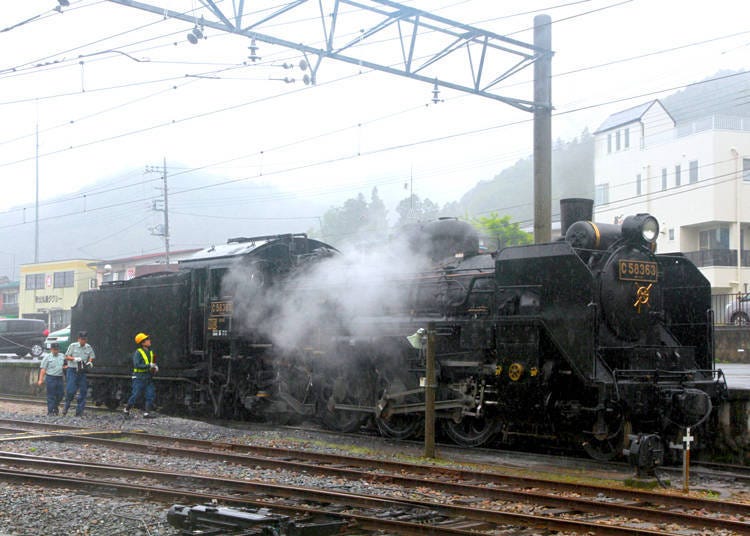
The turntable is where the steam locomotive is able to change its direction. (Unlike a regular train, the SL cannot simply run backwards in order to reverse direction; the turntable is used to help it do so).

You can watch the turntable in operation right at the station in Mitsumineguchi, however, there are actually a very limited number of stations in Japan that have these turntables. Luckily it wasn't raining heavily, so there were many people nearby with their cameras also eager to catch this special moment.
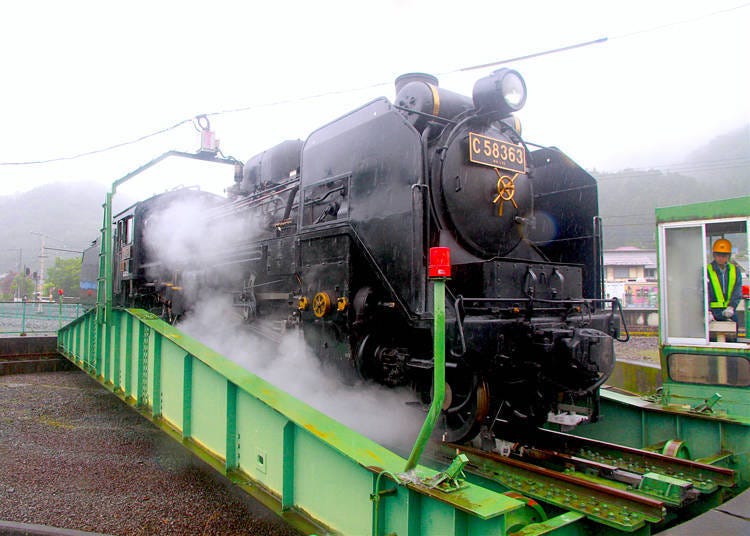
Returning by SL! From Mitsumineguchi to Kumagaya Station
After catching a glimpse of SL maintenance and the turntables, you can also enjoy Mitsumineguchi's specialty soba noodles. If taking a round-trip ride on the SL, it's also a good idea to try to get a seat on the trip back that has a view of the opposite side of the scenery you saw during the first trip.

You can even get the "SL Paleo Express SL Stamp Sheet & Line Information" sheet that is distributed at the stations, which includes clear explanations of "what to see" at "what time" and from "what side of the train," so you will never miss any of the stand-out views.
A Refreshing Beer = A Refreshing Trip for Adults
On the way home, I couldn't help but indulge in a local beer and some snacks from the Saitama region, despite being in the middle of documenting the trip.
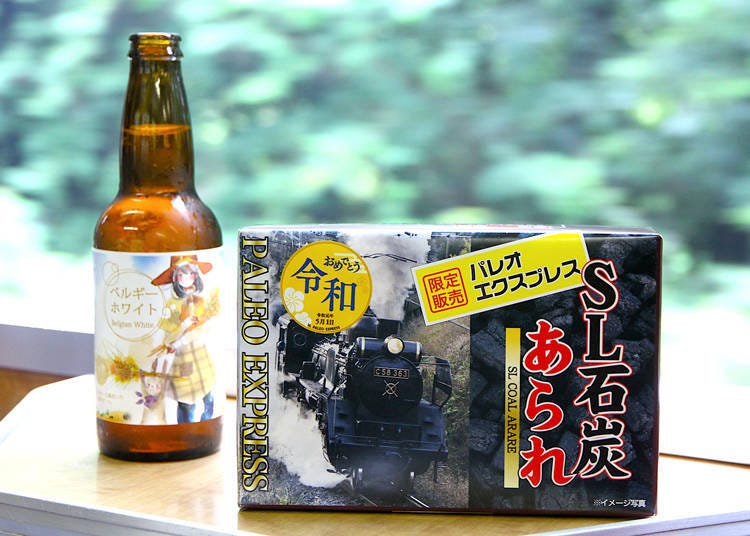
Recommended snack by the writer: SL Coal Arare Rice Crackers (650 yen, tax included). These edible bamboo coal chunks are actually large arare crackers shaped to look just like pieces of coal!
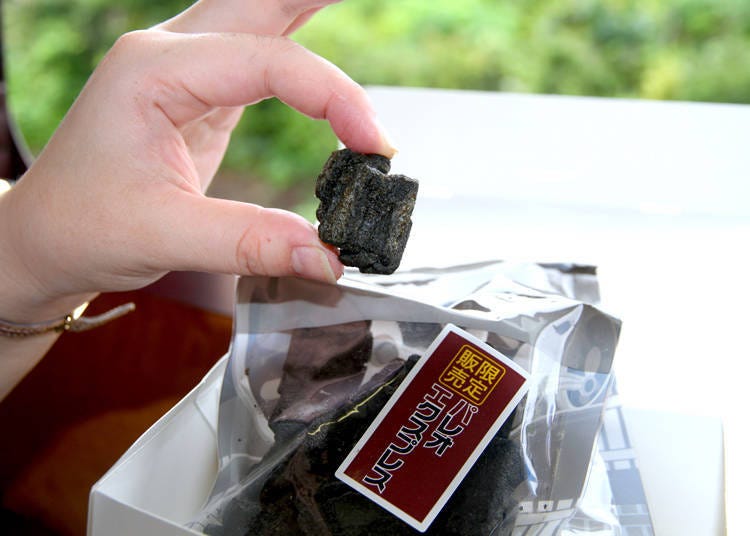
It has quite a unique appearance, but when you eat your first bite, the refined taste and scent of the rice really jumps out at you.
So Many Fun Souvenirs!
There are plenty of SL-related souvenirs available both in-car and at the SL station stops, from Paleo-ken and Palena-chan designed goods to the "C58" SL plate to various other miscellany and Chichibu specialties.
The souvenir our writer purchased: "Connect & Dash C58 GO!" (1100 yen, tax included)
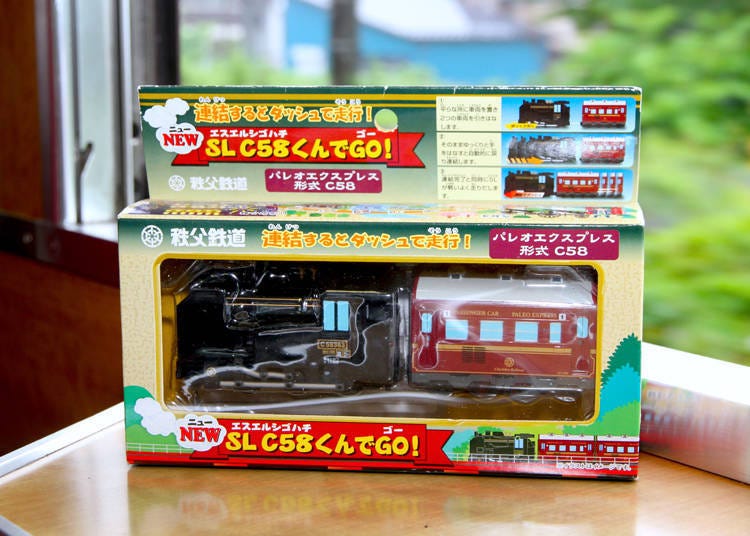
By pulling the locomotive and passenger car, which are attached by a string, left and right, you wind the main spring. When you let go, the toy automatically connects and runs.

It is recommended to play with on a flat surface, as it runs at a rather high speed for its cute, small appearance.
Kumagaya Station: Goodbye C58!
After running many courses of round-trip rides, it's time to say farewell to the SL Paleo Express.

At Kumagaya Station, the last stop, everyone sees off the C58 with a farewell wave.

The SL Paleo Express is the closest steam locomotive from the center of the city. It is a train that has the kind, heart-warming feeling of being right at home.
A calm countryside and majestic mountain views. Cute lunch boxes and snacks and in-car explorations. Seeing the amazing station buildings and freight trains of Chichibu Railway was a wonderful experience.
Written by: Hiroko Kuboki
- Area
*Prices and options mentioned are subject to change.
*Unless stated otherwise, all prices include tax.
Popular Tours & Activitiess
Recommended places for you
-

Top 3 OSHI MAPs for the Best Matcha and Sweets in Tokyo
by: Guest Contributor
-
Ad

What Makes Japanese Yakiniku So Darn Good? Guide to Cuts, Heat, and Wagyu Know-How
-

PokéPark KANTO Is Finally Open! Tokyo's New Pokémon World Starts Before You Even Arrive (2026)
by: Guest Contributor
-
Ad

Japan’s Land of Yokai Monsters and Spooky Stories! A Deep Journey to Mysterious San’in (Tottori & Shimane) for Seasoned Travelers
-

To the Holy Land of Kawaii! Odakyu Tama Center Station Is Becoming a Dreamy Sanrio Wonderland
by: Guest Contributor
-
Ad

5 Recommended Wagyu Yakiniku Restaurants in Tokyo: Signature Dishes, Premium Beef, and Secret Sauces
-
Ad

Pop Culture Paradise: Find All Your Favorite Characters at Sunshine City in Ikebukuro
by: Naho Jishikyu
-

Solo Traveling: Enjoying a Tasty Night Out in Tokyo!
-

LGBTQ-Friendly Bars in Japan: Closeup on Eagle Tokyo! (Video)
-

Enjoy Japanese Culture When Traveling to Tokyo With These Specially Curated Experiences
by: James Davies
-

Secrets to Shopping in Japan: Guide to Annual Sales in Japan & Where to Shop
by: Miyu Shimada
-

Easy Day Trip from Tokyo! Ultimate Sightseeing Guide for Hakone & Lake Ashinoko!
- #best ramen tokyo
- #what to buy in ameyoko
- #what to bring to japan
- #new years in tokyo
- #best izakaya shinjuku
- #things to do tokyo
- #japanese nail trends
- #what to do in odaiba
- #onsen tattoo friendly tokyo
- #daiso
- #best sushi ginza
- #japanese convenience store snacks
- #best yakiniku shibuya
- #japanese fashion culture
- #best japanese soft drinks


















